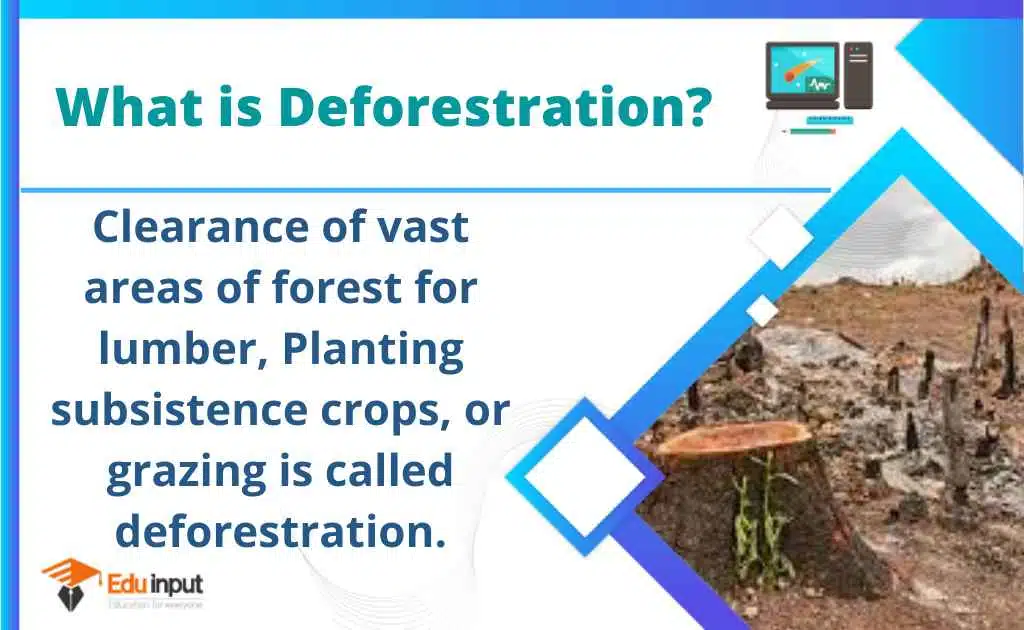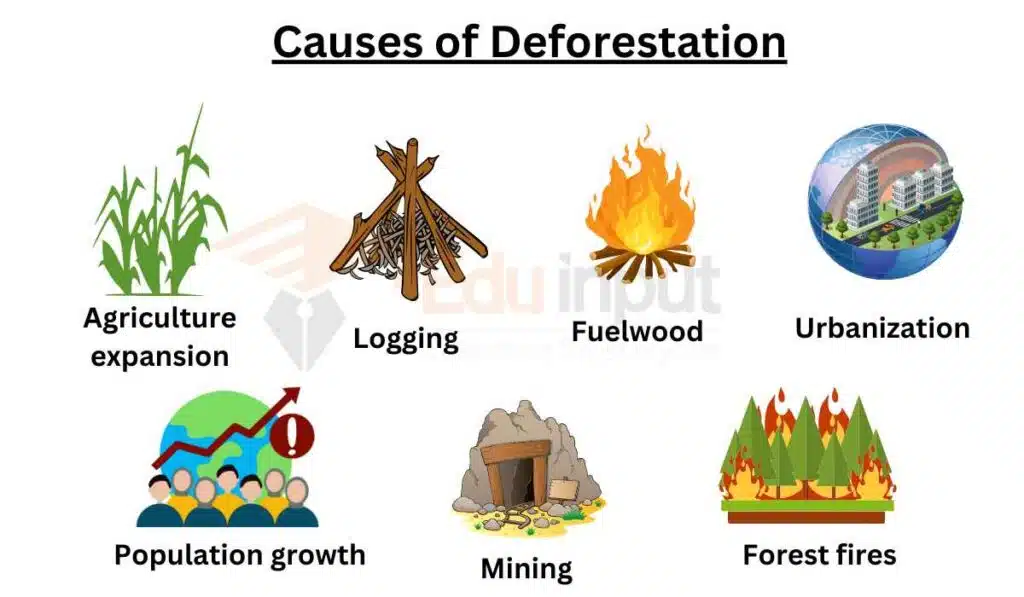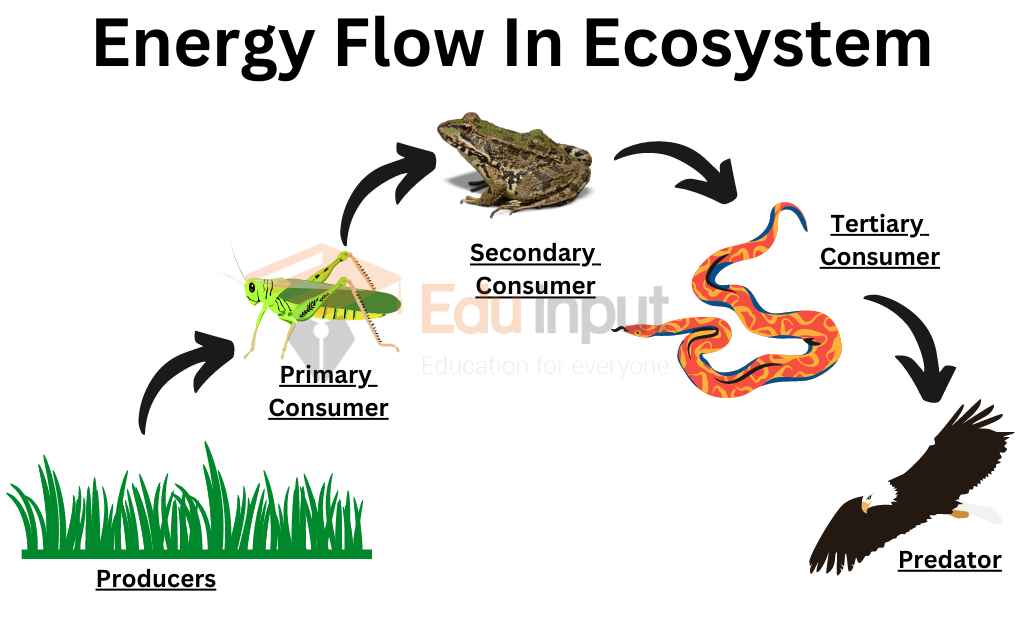What is Deforestation?-Definition, and Causes of Deforestation
Deforestation is the process of destroying trees. It happens when trees are cut down or burned. This leads to the release of carbon dioxide into the atmosphere and water loss. It also has a detrimental effect on the ecosystem.

Causes of Deforestation
Here are the main causes of deforestation:

- Agriculture expansion (clearing land for crops and livestock)
- Logging and timber extraction
- Fuelwood collection for cooking and heating
- Urbanization and infrastructure development
- Mining and extraction of natural resources
- Forest fires (natural or human-induced)
- Illegal and unsustainable practices
- Population growth and increased demands for resources
Effects of Deforestation on Ecosystem
Deforestation causes many negative effects on various species. It also threatens human life as well. It has following effects on the ecosystem:
- Loss of food and water sources
- Destruction of animal habitats and disruption of food chains
- Soil erosion and reduced fertility
- Barren land and loss of biodiversity
- Depletion of oxygen-producing plants
- Negative impact on human health
- Increased greenhouse gas emissions and climate change
- Irreversible changes to ecosystems and difficulty in recovery
Impact of Deforestation on Human Health
75% of emerging diseases in humans comes from animals. The loss of habitats and biodiversity due to deforestation contributes to the increasing incidence of outbreaks. Recognizing this connection, the field of planetary health emphasizes the interdependence of ecosystem health and human health.
| Cause | Percentage of Emerging Diseases Caused by it | Description |
|---|---|---|
| Land-use change | 31% | Environmental Impact |
| Changes in agricultural industry | 15% | Agricultural Practices |
| International travel and commerce | 13% | Global Connectivity |
| Changes in the medical industry | 11% | Healthcare Practices |
| War and famine | 7% | Humanitarian Crises |
| Climate and weather | 6% | Climate Change |
| Human demography and behavior | 4% | Population Dynamics |
| Breakdown of public health | 3% | Healthcare Infrastructure |
| Bushmeat | 3% | Wildlife Trade |
| Changes in the food industry | 2% | Food Production Systems |
| Other | 4% | N/A |
How can we Reduce Deforestation?
Here are 20 strategies to stop deforestation:
- Plant more trees.
- Use less paper.
- Recycle paper and cardboard.
- Use recycled products.
- Buy only sustainable wood products.
- Avoid products containing palm oil.
- Reduce meat consumption.
- Avoid excessive firewood burning.
- Practice eco-forestry.
- Raise awareness.
- Respect the rights of indigenous people.
- Support organizations fighting deforestation.
- Join a community forestry project.
- Help restore degraded forests.
- Fight governmental corruption.
- Support reforestation initiatives.
- Promote agroforestry practices.
- Implement strict logging regulations.
- Encourage sustainable land management.
- Foster international cooperation for forest conservation.
Frequently Asked Questions-FAQs
What is Deforestation?
Deforestation refers to the clearance of vast areas of forests for lumber, grazing cattle or to grow subsistence crops.
What are the effects of deforestation on ecosystem?
Deforestation causes;
Soil Erosion
Barren Soil
Flooding
High concentration of greenhouse gases
What are the main causes of deforestation?
The direct causes of deforestation include agricultural expansion, wood extraction (such as logging or wood harvest for domestic fuel or charcoal), and infrastructure expansion like road construction and urbanization.
What is deforestation and its effects?
Deforestation is the large-scale removal of trees for human activities. It leads to biodiversity loss, habitat damage, water cycle disruption, and soil erosion.
What are 5 harmful effects of deforestation?
Five harmful effects of deforestation are:
1. Climate change
2. Desertification and soil erosion
3. Increased greenhouse gas emissions
4. Decreased groundwater levels
5. Loss of food and habitat for animals, leading to extinction.
How can we control deforestation?
Here are 5 practical ways to control deforestation:
1. Plant trees.
2. Go paperless.
3. Support sustainable companies.
4. Choose certified wood products.
5. Recycle and use recycled products.
What are the solutions to deforestation?
The only solution to deforestation is to take collective action and make sustainable choices. By consuming less, avoiding single-use packaging, eating sustainable food, and choosing recycled or responsibly-produced wood products, we can all play a part in protecting forests.
What will happen if deforestation continues?
If the current rate of deforestation persists, the world’s rainforests will disappear within 100 years. It can result in uncertain consequences for global climate and the loss of a vast number of plant and animal species.





Leave a Reply